What Is Immutable Strings and How It Functions
In the world of programming, understanding the principle of unalterable strings is vital for producing durable and protected applications. Unalterable strings refer to strings that can not be altered after they are created, guaranteeing information stability and predictability within the code. This basic concept plays a crucial duty in various programming languages and offers an unique technique to managing information. By discovering the details of exactly how immutable strings operate, one can uncover a globe of advantages and possibilities that can elevate the quality and efficiency of software program advancement.
The Basics of Immutable Strings
Unalterable strings, as a fundamental concept in programming, are personality series that can not be transformed when they are created. This means that once a string is designated a value, that value can not be modified. In languages like Python and Java, strings are unalterable objects, causing numerous ramifications in regards to memory monitoring and data integrity.
Among the essential benefits of immutable strings is that they give a sense of protection in information adjustment. Since the material of an unalterable string can not be customized, it makes sure that the initial information remains intact, minimizing the risk of unplanned adjustments during program implementation (Why are strings immutable in Java?). This property likewise simplifies debugging processes, as developers can rely on that when a string is specified, its value will certainly not be inadvertently altered
When a new string is created based on an existing one, rather than customizing the original string, the new worth is kept separately. Generally, comprehending the essentials of unalterable strings is critical for mastering shows principles and maximizing code efficiency.
Benefits of Unalterable Strings
Building upon the protection and performance benefits of unalterable strings, their benefits include boosting code integrity and simplifying simultaneous shows jobs. By being unalterable, strings can not be changed after creation, which removes the risk of unplanned modifications in the data they save. This integral immutability makes certain that as soon as a string is produced, its worth continues to be constant throughout the program's execution, decreasing the chances of bugs brought on by unanticipated changes.
Furthermore, immutable strings add to code reliability by making it easier to reason regarding the state of a program. Considering that strings can not be transformed, programmers can rely on that a string will constantly hold the exact same worth, streamlining debugging and maintenance initiatives. This predictability leads to much more dependable and steady codebases.

Application in Programs Languages
Within numerous programs languages, the consolidation of unalterable strings is an essential element that impacts just how data is dealt with and adjusted within code structures. The implementation of unalterable strings varies throughout you can try this out different shows languages, with each language providing its own systems to support this idea.

In comparison, languages like C and C++ do not have integrated support for unalterable strings. Programmers in these languages have to by hand carry out immutability by imposing rules within their code to prevent direct modifications to string things.
Best Practices for Collaborating With Unalterable Strings
When dealing with unalterable strings in programming languages like Java and Python, see page sticking to finest practices guarantees reliable and safe information control. Among the vital best methods is to make use of StringBuilder or StringBuffer rather than straight controling strings, specifically when dealing with substantial concatenation operations. These classes give mutable alternatives for string manipulation, aiding to stay clear of unnecessary memory allotments and enhancing efficiency.
An additional best method is to utilize string interpolation or format functions supplied by the language rather of manual concatenation. This not only improves readability yet additionally aids in stopping typical risks such as unintended string modifications. Furthermore, when functioning with sensitive data such as passwords or API tricks, it is important to prevent storing them as ordinary text in unalterable strings. Using safe storage systems like char ranges or specialized collections for handling sensitive information assists alleviate security risks connected with immutable strings.
Real-world Applications and Instances
Checking out sensible implementations of immutable strings in different industries reveals their substantial effect on data integrity and system dependability. In the healthcare sector, unalterable strings play a crucial function in making sure the safety and security and discretion of client information. By preventing unapproved adjustments to delicate info such as medical records and prescriptions, immutable strings help keep conformity with rigorous personal privacy laws like HIPAA.
Banks also take advantage of the unalterable nature of strings to boost the protection of consumer information and deal documents. Unalterable strings assist protect against scams and unauthorized changes to monetary information, offering a durable defense against cyber threats and making certain the trust and self-confidence of clients.

Conclusion
In conclusion, unalterable strings are taken care of and unchangeable sequences of characters that provide benefits such as thread safety and security and boosted efficiency in shows. They are applied in different programs languages to ensure information integrity and protection. Ideal methods for working with immutable strings consist of preventing direct adjustments and utilizing techniques that return new string objects. Real-world applications of immutable strings include data encryption, caching, and string adjustment jobs.
Unalterable strings refer to strings that can not be altered after they are developed, making certain data honesty and predictability within the code. When a brand-new string is developed based on an existing one, instead than changing the original string, the new value is saved independently.In languages like Java and Python, strings are immutable important link by default, meaning that when a string object is created, its value can not be altered - Why are strings immutable in Java?. Finest methods for working with immutable strings consist of preventing straight modifications and utilizing methods that return new string things. Real-world applications of immutable strings consist of information file encryption, caching, and string control jobs